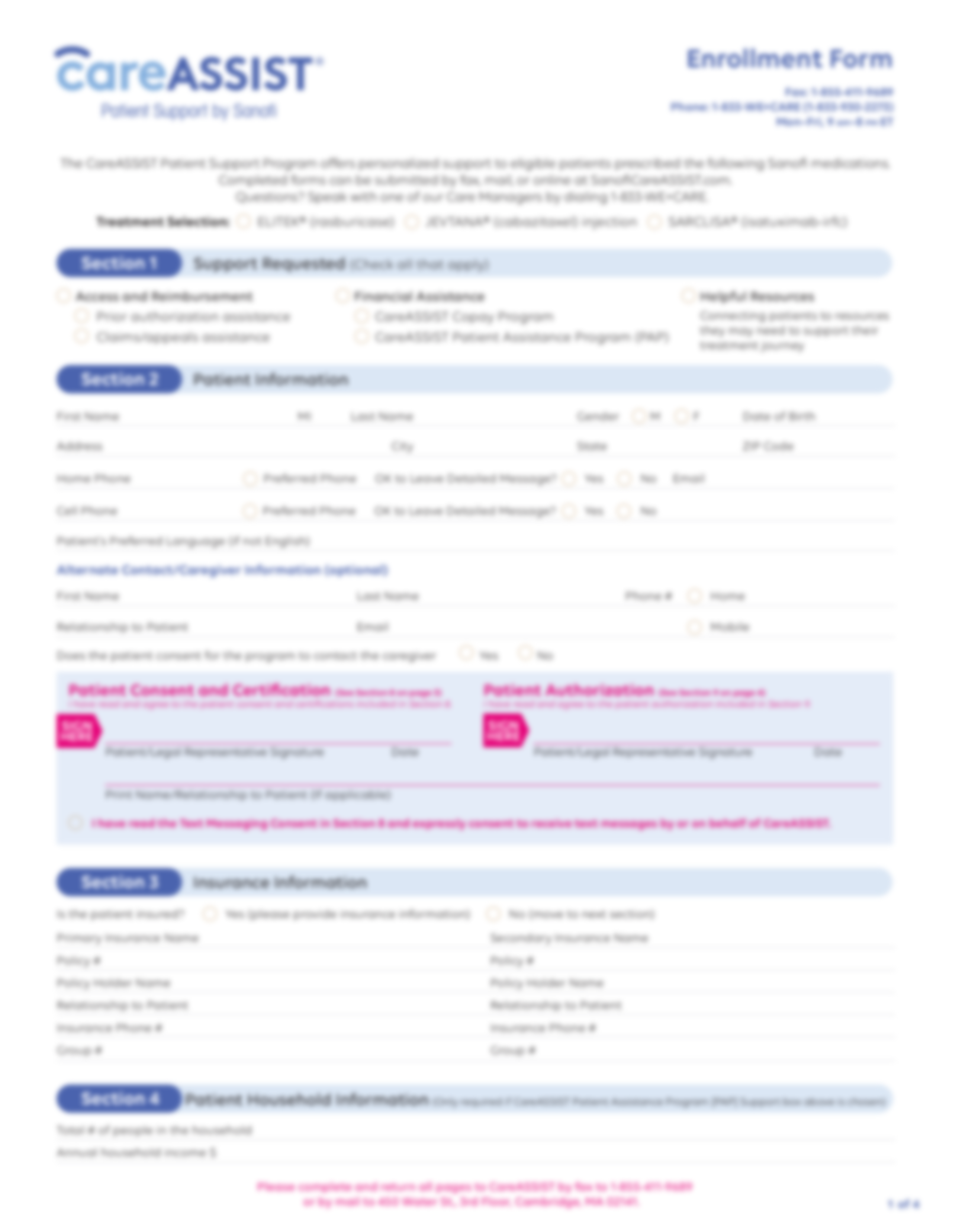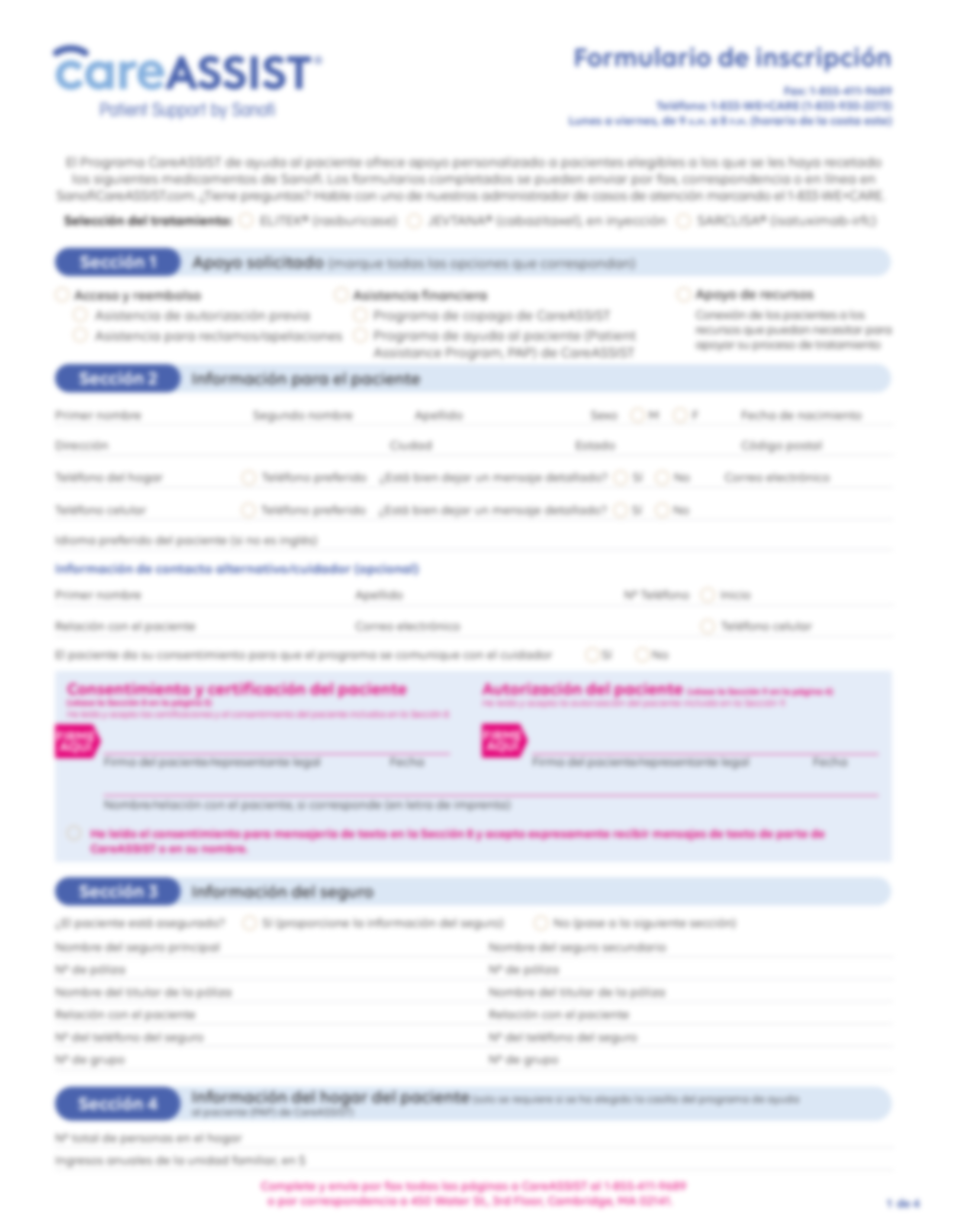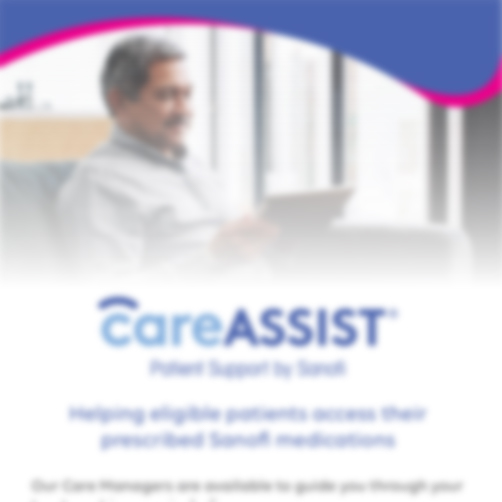Resource support
Get connected to independent support organizations and resources to support your treatment journey
Our Care Managers can provide guidance around additional support resources.
HealthCare.gov
Medicaid.gov
Medicare.gov
Patient Advocate Foundation
Patient Advocate Network Foundation
American Cancer Society
Cancer Support Community
National Comprehensive Cancer Network®
CancerCare
FindHelp.org
*This listing is provided as a resource only and does not constitute an endorsement by Sanofi of any particular organization or its programming. Additional resources on this topic may be available and should be investigated. Sanofi does not review or control the content of non-Sanofi websites.
What is SARCLISA?
SARCLISA is a prescription medicine used in combination with:
• The medicines pomalidomide and dexamethasone, to treat adults who have received at least 2 prior therapies including lenalidomide and a proteasome inhibitor to treat multiple myeloma.
• The medicines carfilzomib and dexamethasone, to treat adults with multiple myeloma who have already received 1 to 3 lines of treatment and they did not work or are no longer working.
It is not known if SARCLISA is safe and effective in children.
Important Safety Information
Do not receive SARCLISA if you have a history of a severe allergic reaction to isatuximab-irfc or any of the ingredients in SARCLISA (see the list of ingredients in the full Prescribing Information).
Before receiving SARCLISA, tell your healthcare provider about all of your medical conditions, including if you:
• Have heart problems, if your healthcare provider prescribes SARCLISA in combination with carfilzomib and dexamethasone for you.
• Have had shingles (herpes zoster).
• Are pregnant or plan to become pregnant. SARCLISA may harm your unborn baby.
–Females who are able to become pregnant should use an effective method of birth control during treatment and for 5 months after your last dose of SARCLISA. Talk to your healthcare provider about birth control methods that you can use during this time.
–Tell your healthcare provider right away if you think you are pregnant or become pregnant during treatment with SARCLISA.
–Before receiving SARCLISA in combination with pomalidomide, females and males must agree to the instructions in the pomalidomide REMS program. The pomalidomide REMS program has specific requirements about birth control, pregnancy testing, blood donation, and sperm donation that you need to know. Talk to your healthcare provider to learn more about pomalidomide.
• Are breastfeeding or plan to breastfeed. It is not known if SARCLISA passes into your breast milk. You should not breastfeed during treatment with SARCLISA.
Tell your healthcare provider about all the medicines you take, including prescription and over-thecounter medicines, vitamins, and herbal supplements.
How will I receive SARCLISA?
• SARCLISA will be given to you by your healthcare provider by intravenous (IV) infusion into your vein.
• SARCLISA is given in treatment cycles of 28 days (4 weeks), together with either the medicines pomalidomide and dexamethasone, or carfilzomib and dexamethasone.
– In cycle 1, SARCLISA is usually given weekly.
– Starting in cycle 2, SARCLISA is usually given every 2 weeks.
• If you miss any appointments, call your healthcare provider as soon as possible to reschedule your appointment.
• Your healthcare provider will give you medicines before each dose of SARCLISA to help reduce the risk of infusion reactions (make them less frequent and severe).
What are the possible side effects of SARCLISA?
SARCLISA may cause serious side effects, including:
• Infusion reactions. Infusion reactions are common with SARCLISA and can sometimes be severe or life threatening.
–Your healthcare provider will prescribe medicines before each infusion of SARCLISA to help decrease your risk for infusion reactions or to help make any infusion reaction less severe. You will be monitored for infusion reactions during each dose of SARCLISA.
–Your healthcare provider may slow down or stop your infusion, or completely stop treatment with SARCLISA if you have an infusion reaction.
Get medical help right away if you develop any of the following symptoms of infusion reaction during or after an infusion of SARCLISA:
–shortness of breath, wheezing, or trouble breathing
–swelling of the face, mouth, throat, or tongue
–throat tightness
–palpitations
–dizziness, lightheadedness, or fainting
–headache
–cough
–rash or itching
–nausea
–runny or stuffy nose
–chills
• Decreased white blood cell counts. Decreased white blood cell counts are common with SARCLISA and certain white blood cells can be severely decreased. You may have an increased risk of getting certain infections, such as upper and lower respiratory tract infections and urinary tract infections.
–Your healthcare provider will check your blood cell counts during treatment with SARCLISA. Your healthcare provider may prescribe an antibiotic or antiviral medicine to help prevent infection, or a medicine to help increase your white blood cell counts during treatment with SARCLISA.
–Tell your healthcare provider right away if you develop any fever or symptoms of infection during treatment with SARCLISA.
• Risk of new cancers. New cancers have happened in people during treatment with SARCLISA. Your healthcare provider will monitor you for new cancers during treatment with SARCLISA.
• Change in blood tests. SARCLISA can affect the results of blood tests to match your blood type. Your healthcare provider will do blood tests to match your blood type before you start treatment with SARCLISA. Tell all of your healthcare providers that you are being treated with SARCLISA before receiving blood transfusions.
The most common side effects of SARCLISA in combination with pomalidomide and dexamethasone include:
• upper respiratory tract infection
• lung infection (pneumonia)
• decreased red blood cell count (anemia)
• diarrhea
• decreased platelet count (thrombocytopenia)
The most common side effects of SARCLISA in combination with carfilzomib and dexamethasone include:
• upper respiratory tract infection
• tiredness and weakness
• high blood pressure
• diarrhea
• lung infection (pneumonia)
• trouble breathing
• trouble sleeping
• bronchitis
• cough
• back pain
• decreased red blood cell count (anemia)
• decreased platelet count (thrombocytopenia)
Heart failure can happen during treatment with SARCLISA in combination with carfilzomib and dexamethasone. Tell your healthcare provider right away if you develop any of the following symptoms:
•trouble breathing
•cough
•swelling of your ankles, feet, or legs
These are not all the possible side effects of SARCLISA. For more information, ask your healthcare provider or pharmacist.
You are encouraged to report negative side effects of prescription drugs to the FDA. Visit www.fda.gov/medwatch, or call 1-800-FDA-1088.
Please see full Prescribing Information, including Patient Information.
Questions? Our Care Managers are here to help
Contact us:
Monday through Friday,
9 AM – 8 PM ET
Phone:
1-833-WE+CARE (1-833-930-2273)
Fax:
1-855-411-9689
Mail:
CareASSIST by Sanofi, 450 Water St., 3rd fl,
Cambridge, MA 02141


